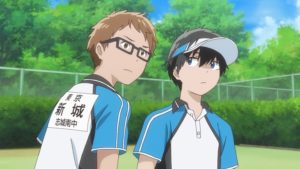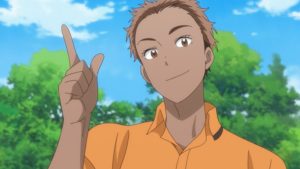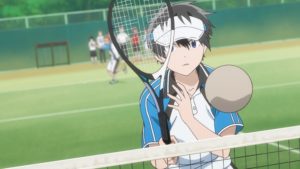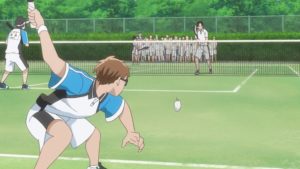What happened to Hoshiai no Sora? Only a shadow of the remarkable animation it displayed in its first half remains at this point. There are recycled cuts all over this episode, and its general sense of progression reeks of a hurried ending. Half the show’s scripts are saturated with personal and familial drama, while the other half follow the sports anime playbook to the letter. Maki’s dad hasn’t shown his face in six episodes, and its original pay-to-play hook has hardly mattered in the grand scheme of things. At this point, I’m hoping that the cryptic post-credits conversation between Ryouma and his mother will lead to a major development in the finale. The series needs to tie off at least a few of its many unspooled plot threads somehow, and a late-game curveball might be its only chance at a cohesive finish.
Though this was a sports-heavy episode, it found time to elaborate on some of the parent/child dynamics we’ve seen previously. Rintaro gets a text from his biological mom, who he seems to spot in the crowd, and runs after her – this scene is left incomplete. Nao, bothered by his phone’s constant buzzing, stows his cell in his equipment bag so his mom’s calls can’t reach him – this story is still unfinished in my eyes, but the show’s attitude is “mission accomplished.” The decision to put away his phone is immediately preceded by Nao’s dual realizations that tennis is fun, and that he can change. This is the same kid, mind you, who willfully locked a small child in an abandoned school room to cause confusion and panic, all so that he wouldn’t have to play in a tennis match. There must have been a significant catalyst at work for him to undergo such a change in attitude, right? Wrong. He’s just excited to watch the main characters play their match.
And play their match they do, against the previously-introduced Joy, who was revealed in this episode to be a shallow showboat. There were probably half a dozen scenes of hastily-animated fangirls cheering for him, or pouting and complaining once Maki and Toma develop a strategy that circumvents his freakish height. We learned several episodes ago that he had legions of female admirers, but that fact seemed to define his character here. During the game, he seemed more interested in preening than competing, referring to himself as a “stud” and telling his partner to hurry up and crush their opponents so he could go buy a smoothie. Even after their loss, he wondered aloud whether the table tennis club would be a better avenue for bolstering his popularity. My question is: where’s the satisfaction in beating an opponent like this? The guy hardly cares about the sport he’s playing – a sport which is central to the show he occupies. Who cares whether he wins or loses, or in what manner?
The next two rounds go swimmingly for Shijo Middle, but not for fans of Hoshiai no Sora’s once-excellent animation. Maki and Toma blow through their second match in a flurry of reused shots, none of which create the sense of a flowing four-man contest. I can’t even picture their opponents’ faces – I think their uniforms were pink? Compare this to the clear personalities and team dynamics of the Misaki students from the show’s middle section, and you’ll notice a clear difference. As if the second round wasn’t limp enough, the third is over in 11 seconds, most of which is spent on close-ups of the main characters. Sure, the show wants to hurry up and get to the pivotal match against the Itsuse twins, but if tennis was a priority all along, why not structure your series to create more build-up before that final clash?
That’s just the issue, though: tennis hasn’t felt like a priority all along. Sometimes the series is all about the boys’ terrible home lives, or the way they rely on each other to get through their days. Sometimes it’s about physical abuse, or parental neglect, or bullying, or LGBTQ acceptance, or controlling mothers, or the conflicted emotions of an adopted child, or sibling relationships, or pathological lying, or unreasonable expectations for developing children, and the list goes on. Each of these are worthy topics to build a show around. Cram them into one series, though, and it becomes too much, especially when some of those issues manifest themselves in unresolved conflicts between parents and children.
Hoshiai no Sora’s defenders will say that such complicated issues would never be neatly resolved in reality, so the show shouldn’t be responsible for resolving them, either. I respectfully disagree. This is a work of fiction, and fictional stories ought to have a beginning, middle, and end. That doesn’t mean that all the show’s narrative components must form identical circuits; it means that they ought to provide a sense of closure. Yuta’s mom lecturing her son about his gender and absolving herself of blame, then disappearing from the show, is not closure. Nao zipping up his equipment bag with his phone inside, thus temporarily muting his mother’s overbearing presence, is not closure. This show’s televised run is coming to an end in just another week, but with these and so many other plot threads frayed and incomplete, there’s a chance that its individual stories won’t reach that same end.





Guess I’ll have and grin and bear it with the last episode, because it’s clear that Akane’s going to go for that very convenient, schmaltzy ending where Maki wins it for everyone, while allowing most of the conflicts to go either unresolved or the parents just suddenly forgiving the kids and/or humiliated/humbled from just seeing them win. I thought Akane wanted to make a “realistic” story.
It’s unfortunate that the good qualities the show had (the animation in the early episodes, the OP/ED, the LGBT themes) were drowned out by the melodrama and the schmaltz along with the other issues you’ve brought up. It’s what ruined Tsurune for me, although I would say this was way better than that show since it didn’t have blatantly evil opponents nor the meandering pacing Tsurune had.
Tsurune was a disappointment for me, as well. Original sports anime are difficult to write, it seems – with no manga to function as a blueprint, they’re liable to get lost in themselves somewhere along the way.
EDIT: Just checked, and Tsurune was based on a light novel, which pretty much invalidates my comment. Oops! :^)
Maki’s dad….?
He is just scared to hell of Glasses-kun, totally terrified, suffering PTSD actually, nobody ever heard of him again. Problem solved.
Didn’t you receive the memo that demanded to go the extra step with “suspension of disbelief”?